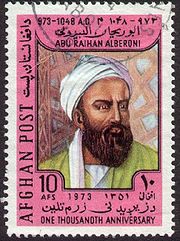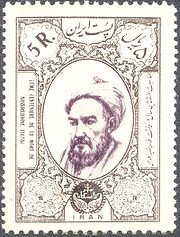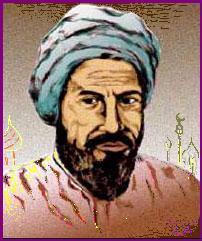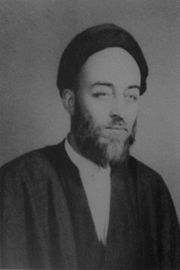
List of Muslim philosophers
Encyclopedia
A Muslim philosopher is a person that professes Islam and engaged in the philosophical aspect of Islamic studies
, for example theology
or eschatology
and other fields of Islamic philosophy
.
Islamic studies
In a Muslim context, Islamic studies can be an umbrella term for all virtually all of academia, both originally researched and as defined by the Islamization of knowledge...
, for example theology
Theology
Theology is the systematic and rational study of religion and its influences and of the nature of religious truths, or the learned profession acquired by completing specialized training in religious studies, usually at a university or school of divinity or seminary.-Definition:Augustine of Hippo...
or eschatology
Eschatology
Eschatology is a part of theology, philosophy, and futurology concerned with what are believed to be the final events in history, or the ultimate destiny of humanity, commonly referred to as the end of the world or the World to Come...
and other fields of Islamic philosophy
Islamic philosophy
Islamic philosophy is a branch of Islamic studies. It is the continuous search for Hekma in the light of Islamic view of life, universe, ethics, society, and so on...
.
List of Islamic philosophers
| Name | Latinization | Portrait | Born-Died | Madh'hab | School of Philosophy |
|---|---|---|---|---|---|
| Al Kindi (Abū Yūsuf Yaʻqūb ibn Isḥāq al-Kindī) | Alkindus | 801-873 | Peripatetic Peripatetic The Peripatetics were members of a school of philosophy in ancient Greece. Their teachings derived from their founder, the Greek philosopher, Aristotle, and Peripatetic is a name given to his followers. The school originally derived its name Peripatos from the peripatoi of the Lyceum gymnasium in... |
||
| Al Farabi (ابو نصر محمد الفارابي,Abū Naṣr Muḥammad al-Fārābi) | Alpharabius | 870-950 | Peripatetic Peripatetic The Peripatetics were members of a school of philosophy in ancient Greece. Their teachings derived from their founder, the Greek philosopher, Aristotle, and Peripatetic is a name given to his followers. The school originally derived its name Peripatos from the peripatoi of the Lyceum gymnasium in... |
||
| Ibn Masarrah (أبو عبد الله محمد بن عبد الله بن مسرة بن نجيح الجبلي, Abu 'Abd Allah Muhammad b. 'Abd Allah b. Masarra b. Najih al-Jabali) | 883-931 | ||||
| Al Amiri (أبو الحسن محمد ابن يوسف العامري, Abu al-Hassan Muhammad ibn Yusuf al-Amiri) | ?-992 | ||||
| Ibn Miskawayh Ibn Miskawayh Abu 'Ali Ahmad ibn Muhammad ibn Ya'qub Ibn Miskawayh, also known as Ibn Miskawayh or Ebn Meskavayh was a Persian chancery official of the Buwayhid era, and philosopher and historian from Rey, Iran... (Abu 'Ali Ahmad ibn Muhammad ibn Ya'qub Ibn Miskawayh) |
932-1030 | Neo-Platonism | |||
| Ibn al-Haytham (أبو علي، الحسن بن الحسن بن الهيثم, Abū ʿAlī al-Ḥasan ibn al-Ḥasan ibn al-Haytham) | Alhazen |  |
965-1040 | Mu'tazili Mu'tazili ' is an Islamic school of speculative theology that flourished in the cities of Basra and Baghdad, both in present-day Iraq, during the 8th–10th centuries. The adherents of the Mu'tazili school are best known for their having asserted that, because of the perfect unity and eternal nature of God,... , Ash'ari Ash'ari The Ashʿari theology is a school of early Muslim speculative theology founded by the theologian Abu al-Hasan al-Ash'ari... , Shia (disputed) |
|
| Al-Biruni Al-Biruni Abū al-Rayḥān Muḥammad ibn Aḥmad al-BīrūnīArabic spelling. . The intermediate form Abū Rayḥān al-Bīrūnī is often used in academic literature... (Abū Rayḥān al-Bīrūnī) |
Alberonius |  |
5 September 973-13 December 1048 | ||
| Ibn Sina (Abu-Ali al-Husayn ibn 'Abd Allah ibn Sina) | Avicenna | 980-1037 | Hanafi Hanafi The Hanafi school is one of the four Madhhab in jurisprudence within Sunni Islam. The Hanafi madhhab is named after the Persian scholar Abu Hanifa an-Nu‘man ibn Thābit , a Tabi‘i whose legal views were preserved primarily by his two most important disciples, Abu Yusuf and Muhammad al-Shaybani... , Ismaili Ismaili ' is a branch of Shia Islam. It is the second largest branch of Shia Islam, after the Twelvers... (disputed) |
Avicennism | |
| Al-Qushayri (Abd al-Karim ibn Hawazin al-Qushayri) | 986-1072 | ||||
| Al-Ghazali Al-Ghazali Abu Hāmed Mohammad ibn Mohammad al-Ghazzālī , known as Algazel to the western medieval world, born and died in Tus, in the Khorasan province of Persia was a Persian Muslim theologian, jurist, philosopher, and mystic.... (ابو حامد محمد ابن محمد الغزالی,Abu Hāmed Mohammad ibn Mohammad al-Ghazzālī) |
Algazel | 1058-19 December 1111 | Shafi'ite, Asharite, Sufi | ||
| Al Baghdaadi (Hibat Allah Abu'l-Barakat al-Baghdaadi) | 1080-1165 | Illuminationism Illuminationism Illuminationism is a doctrine in theology according to which the process of human thought needs to be aided by God. It is the oldest and most influential alternative to naturalism in the theory of mind and epistemology... |
|||
| Ibn Bajjah Ibn Bajjah Abū-Bakr Muhammad ibn Yahya ibn al-Sāyigh , known as Ibn Bājjah , was an Andalusian polymath: an astronomer, logician, musician, philosopher, physician, physicist, psychologist, botanist, poet and scientist. He was known in the West by his Latinized name, Avempace... (أبو بكر محمد بن يحيى بن الصائغ,Abū-Bakr Muhammad ibn Yahya ibn al-Sāyigh) |
Avempace | 1095-1138 | |||
| Ayn al-Quzat Hamadani (ابوالمعالی عبدالله بن ابیبکر محمد میانجی,Abu’l-maʿālī ʿabdallāh Bin Abībakr Mohammad Mayānejī) | 1098-1131 | ||||
| Ibn Tufail Ibn Tufail Ibn Tufail was an Andalusian Muslim polymath: an Arabic writer, novelist, Islamic philosopher, Islamic theologian, physician, vizier,... (أبو بكر محمد بن عبد الملك بن محمد بن طفيل القيسي الأندلسي,Abu Bakr Muhammad ibn Abd al-Malik ibn Muhammad ibn Tufail al-Qaisi al-Andalusi) |
Abubacer Aben Tofail | 1105-1185 | Maliki Maliki The ' madhhab is one of the schools of Fiqh or religious law within Sunni Islam. It is the second-largest of the four schools, followed by approximately 25% of Muslims, mostly in North Africa, West Africa, the United Arab Emirates, Kuwait, and in some parts of Saudi Arabia... |
||
| Ibn Rushd (أبو الوليد محمد بن احمد بن رشد,ʾAbū l-Walīd Muḥammad bin ʾAḥmad bin Rušd) | Averroes | 1126-1198 | Maliki Maliki The ' madhhab is one of the schools of Fiqh or religious law within Sunni Islam. It is the second-largest of the four schools, followed by approximately 25% of Muslims, mostly in North Africa, West Africa, the United Arab Emirates, Kuwait, and in some parts of Saudi Arabia... |
Averroism Averroism Averroism is the term applied to either of two philosophical trends among scholastics in the late 13th century: the Arab philosopher Averroës or Ibn Rushd's interpretations of Aristotle and his reconciliation of Aristotelianism with Islamic faith; and the application of these ideas in the Latin... |
|
| Farīd ud-Dīn (ابو حمید ابن ابوبکر ابراهیم,Abū Hamīd bin Abū Bakr Ibrāhīm) | 1145-1220 | ||||
| Najmuddin Kubra | 1145-1220 | Kubrawiyya | |||
| Umar Suhrawardi (Abu Hafs Umar al-Suhrawardi) | 1145-1234 | Suhrawardiyya Suhrawardiyya Suhrawardy redirects here. For the East Bengali politician and Prime Minister of Pakistan, see Huseyn Shaheed Suhrawardy. The well-known Shahab al-Din Suhrawardi "the Executed" , the Shia founder of Illuminationism, is unconnected.... |
|||
| Fakhr al-Din al-Razi Fakhr al-Din al-Razi Abu Abdullah Muhammad ibn Umar ibn al-Husayn al-Taymi al-Bakri al-Tabaristani Fakhr al-Din al-Razi , most commonly known as Fakhruddin Razi was a well-known Persian Sunni Muslim theologian and philosopher.... (Abu Abdullah Muhammad ibn Umar ibn al-Husayn al-Taymi al-Bakri al-Tabaristani Fakhr al-Din al-Razi) |
1149-1209 | Hanafi Hanafi The Hanafi school is one of the four Madhhab in jurisprudence within Sunni Islam. The Hanafi madhhab is named after the Persian scholar Abu Hanifa an-Nu‘man ibn Thābit , a Tabi‘i whose legal views were preserved primarily by his two most important disciples, Abu Yusuf and Muhammad al-Shaybani... , Shafi'i Shafi'i The Shafi'i madhhab is one of the schools of fiqh, or religious law, within the Sunni branch of Islam. The Shafi'i school of fiqh is named after Imām ash-Shafi'i.-Principles:... |
|||
| Shahab al-Din Suhrawardi Shahab al-Din Suhrawardi Other important Muslim mystics carry the name Suhrawardi, particularly Abu 'l-Najib al-Suhrawardi and his paternal nephew Abu Hafs Umar al-Suhrawardi."Shahāb ad-Dīn" Yahya ibn Habash as-Suhrawardī was a Persian... (Shahāb ad-Dīn" Yahya ibn Habash as-Suhrawardī) |
Sohrevardi | 1155-1191 | Illuminationism Illuminationism Illuminationism is a doctrine in theology according to which the process of human thought needs to be aided by God. It is the oldest and most influential alternative to naturalism in the theory of mind and epistemology... |
||
| Ibn Arabi Ibn Arabi Ibn ʿArabī was an Andalusian Moorish Sufi mystic and philosopher. His full name was Abū 'Abdillāh Muḥammad ibn 'Alī ibn Muḥammad ibn `Arabī .-Biography:... (أبو عبد الله محمد بن علي بن محمد بن عربي,Abū 'Abdillāh Muḥammad ibn 'Alī ibn Muḥammad ibn `Arabī ) |
8 July 1165-10 November 1240 | ||||
| Nasir al-Din al-Tusi Nasir al-Din al-Tusi Khawaja Muḥammad ibn Muḥammad ibn Ḥasan Ṭūsī , better known as Naṣīr al-Dīn al-Ṭūsī , was a Persian polymath and prolific writer: an astronomer, biologist, chemist, mathematician, philosopher, physician, physicist, scientist, theologian and Marja Taqleed... (Khawaja Muḥammad ibn Muḥammad ibn Ḥasan Ṭūsī) |
 |
18 February 1201- 26 June 1274 | Twelver Shi'ism | Avicennism | |
| Rumi (جلالالدین محمد بلخى, Jalāl ad-Dīn Muḥammad Balkhī) | 1207- 17 December 1273 | ||||
| Ibn al-Nafis (علاء الدين أبو الحسن عليّ بن أبي حزم القرشي الدمشقي,Ala-al-din abu Al-Hassan Ali ibn Abi-Hazm al-Qarshi al-Dimashqi) |  |
1213-17 December 1288 | Shafi'i Shafi'i The Shafi'i madhhab is one of the schools of fiqh, or religious law, within the Sunni branch of Islam. The Shafi'i school of fiqh is named after Imām ash-Shafi'i.-Principles:... |
Avicennism | |
| Qotb al-Din Shirazi (قطبالدین کازرونی شیرازی) | 1217-1311 | ||||
| Ibn Sabin Ibn Sabin Abu Mohammed Abd el-Hakh Ibn Sabin was a Sufi philosopher, the last philosopher of the Andalous in the west land of Islamic world. He was born in 1217 in Spain and lived in Ceuta. He was known for his replies to questions sent to him by Frederick II, ruler of Sicily... (Abu Mohammed Abd el-Hakh Ibn Sabin) |
1236-1269 | ||||
| Mahmud Shabistari Mahmud Shabistari Mahmūd Shabistarī is one of the most celebrated Persian Sufi poets of the 14th century.-Life and work:Shabistari was born in the town of Shabestar near Tabriz in 1288 , where he received his education. He became deeply versed in the symbolic terminology of Ibn Arabi... (محمود شبستری) |
1288-1340 | ||||
| Taftazani Taftazani Sa'ad al-Din Masud ibn Umar ibn Abd Allah al-Taftazani also known as Al-Taftazani and Taftazani was a Muslim Persian polymath... (سعدالدین مسعودبن عمربن عبداللّه هروی خراسانی تفتازانی,ASa'ad al-Din Masud ibn Umar ibn Abd Allah al-Taftazani) |
1322-1390 | Hanafi Hanafi The Hanafi school is one of the four Madhhab in jurisprudence within Sunni Islam. The Hanafi madhhab is named after the Persian scholar Abu Hanifa an-Nu‘man ibn Thābit , a Tabi‘i whose legal views were preserved primarily by his two most important disciples, Abu Yusuf and Muhammad al-Shaybani... , Maturidi Maturidi In Islam, a Maturidi is one who follows Abu Mansur Al Maturidi's theology, which is a close variant of the Ash'ari theology . The Maturidis, Ash'aris and Atharis are all part of Sunni Islam, which makes up the overwhelming majority of Muslims... |
|||
| Abdul Karim Jili | 1366-1424 | Al Akbariyya Al Akbariyya Al Akbariyya was a secret Sufi society founded in Paris in 1911 by the wandering Swedish Sufi 'Abdu l-Hadi Aguéli. Among its first members was René Guénon. Its purpose was to promote the teachings of Muhyeddin Ibn al-Arabi among the "scholarly, educated and freethinking classes..." through the... |
|||
| Ibn Khaldun Ibn Khaldun Ibn Khaldūn or Ibn Khaldoun was an Arab Tunisian historiographer and historian who is often viewed as one of the forerunners of modern historiography, sociology and economics... (أبو زيد عبد الرحمن بن محمد بن خلدون الحضرمي,Abū Zayd ‘Abdu r-Raḥman bin Muḥammad bin Khaldūn Al-Hadrami) |
27 May 1332-19 March 1406 | Maliki Maliki The ' madhhab is one of the schools of Fiqh or religious law within Sunni Islam. It is the second-largest of the four schools, followed by approximately 25% of Muslims, mostly in North Africa, West Africa, the United Arab Emirates, Kuwait, and in some parts of Saudi Arabia... |
|||
| Jami Jami Nur ad-Dīn Abd ar-Rahmān Jāmī also known as DJāmī, Mawlanā Nūr al-Dīn 'Abd al-Rahmān or Abd-Al-Rahmān Nur-Al-Din Muhammad Dashti who is commonly known as Jami , is known for his achievements as a scholar, mystic, writer, composer of numerous lyrics and idylls, historian, and one of the greatest... (نورالدین عبدالرحمن جامی,Nur ad-Din Abd ar-Rahman Jami) |
18 August 1414-17 November 1492 | ||||
| Mir Fendereski Mir Fendereski Mir Fendereski was a renowned Iranian philosopher, poet and mystic of the Safavid era. His full name is given as Sayyed Mir Abulqasim Astarabadi , and he is famously known as Fendereski... |
1562-1640 | Twelver Shi'ism | |||
| Mulla Sadra Mulla Sadra Ṣadr ad-Dīn Muḥammad Shīrāzī also called Mulla Sadrā was a Persian Shia Islamic philosopher, theologian and ‘Ālim who led the Iranian cultural renaissance in the 17th century... (Ṣadr ad-Dīn Muḥammad Shīrāzī) |
1571-1641 | Twelver Shi'ism | Illuminationism Illuminationism Illuminationism is a doctrine in theology according to which the process of human thought needs to be aided by God. It is the oldest and most influential alternative to naturalism in the theory of mind and epistemology... , Existentialism Existentialism Existentialism is a term applied to a school of 19th- and 20th-century philosophers who, despite profound doctrinal differences, shared the belief that philosophical thinking begins with the human subject—not merely the thinking subject, but the acting, feeling, living human individual... |
||
| Mir Damad Mir Damad Mir Damad , known also as Mir Mohammad Baqer Esterabadi, or Asterabadi, was an Iranian philosopher in the Neoplatonizing Islamic Peripatetic traditions of Avicenna and Suhrawardi, a scholar of the traditional Islamic sciences, and foremost figure , of the cultural renaissance of Iran undertaken... (Mir Mohammad Baqer Esterabadi) |
?-1631 | Twelver Shi'ism | |||
| Qazi Sa’id Qumi Qazi Sa’id Qumi Qazi Sa’id Qumi was an Iranian Muslim philosopher .In Isfahan he was the pupil of Rajab Ali Tabrizi, Muhsen Feyz and Abd al-Razzaq Lahiji... |
1633-1692 | ||||
| Shah Waliullah Shah Waliullah Shah Waliullah Muhaddith Dehlvi was an Islamic scholar and reformer. He was born during the reign of Aurangzeb. He worked for the revival of Muslim rule and intellectual learning in South Asia, during a time of waning Muslim power... (Shah Waliullah Muhaddith Dehlvi) |
2 February 1703- 20 August 1762 | Hanafi Hanafi The Hanafi school is one of the four Madhhab in jurisprudence within Sunni Islam. The Hanafi madhhab is named after the Persian scholar Abu Hanifa an-Nu‘man ibn Thābit , a Tabi‘i whose legal views were preserved primarily by his two most important disciples, Abu Yusuf and Muhammad al-Shaybani... |
|||
| Allama Muhammad Iqbal Muhammad Iqbal Sir Muhammad Iqbal , commonly referred to as Allama Iqbal , was a poet and philosopher born in Sialkot, then in the Punjab Province of British India, now in Pakistan... (محمد اقبال) |
 |
9 November 1877 – 21 April 1938 | Hanafi Hanafi The Hanafi school is one of the four Madhhab in jurisprudence within Sunni Islam. The Hanafi madhhab is named after the Persian scholar Abu Hanifa an-Nu‘man ibn Thābit , a Tabi‘i whose legal views were preserved primarily by his two most important disciples, Abu Yusuf and Muhammad al-Shaybani... |
||
| Allameh Muhammad Husayn Tabatabaei (علامه سید محمد حسین طباطبائی) |  |
1892-1981 | Twelver Shi'ism | ||
| Mawlana Faizani Mawlana Faizani Mawlana Faizani was born 17 April 1923 in Herat, Afghanistan to a family of miagan... (Mawlana Muhammad Atta-ullah Faizani) |
17 April 1923- ? (possibly living) | ||||
| Grand Ayatollah Abdollah Javadi-Amoli Abdollah Javadi-Amoli Grand Ayatollah Abdollah Javadi-Amoli is an Iranian Twelver Shi'a Marja. He is a conservative Iranian politician and one of the prominent Islamic scholars of the Hawza in Qom.-Early life:He was born in 1933 in Amol, north of Iran... (عبدالله جوادی آملی) |
1933- | Ja'fari | Transcendent Theosophy Transcendent Theosophy Transcendent theosophy or al-hikmat al-muta’li , the doctrine and philosophy developed by Persian philosopher, Mulla Sadra, is one of two main disciplines of Islamic philosophy that is currently live and active.... |
||
| Hossein Nasr (عبدالله جوادی آملی) |  |
7 April 1933- | Twelver Shi'ism | ||
| Grand Ayatollah Mohammad Baqir al-Sadr (محمد باقر الصدر) |  |
1 March 1935 – 9 April 1980 | Usuli | ||
| Geydar Dzhemal | 6 November 1947- | ||||
| Muqtedar Khan (مقتدر خان) | 1966- | ||||
See also
- Contemporary Islamic philosophy
- Early Islamic philosophyEarly Islamic philosophyEarly Islamic philosophy or classical Islamic philosophy is a period of intense philosophical development beginning in the 2nd century AH of the Islamic calendar and lasting until the 6th century AH...
- Lists of philosophers

